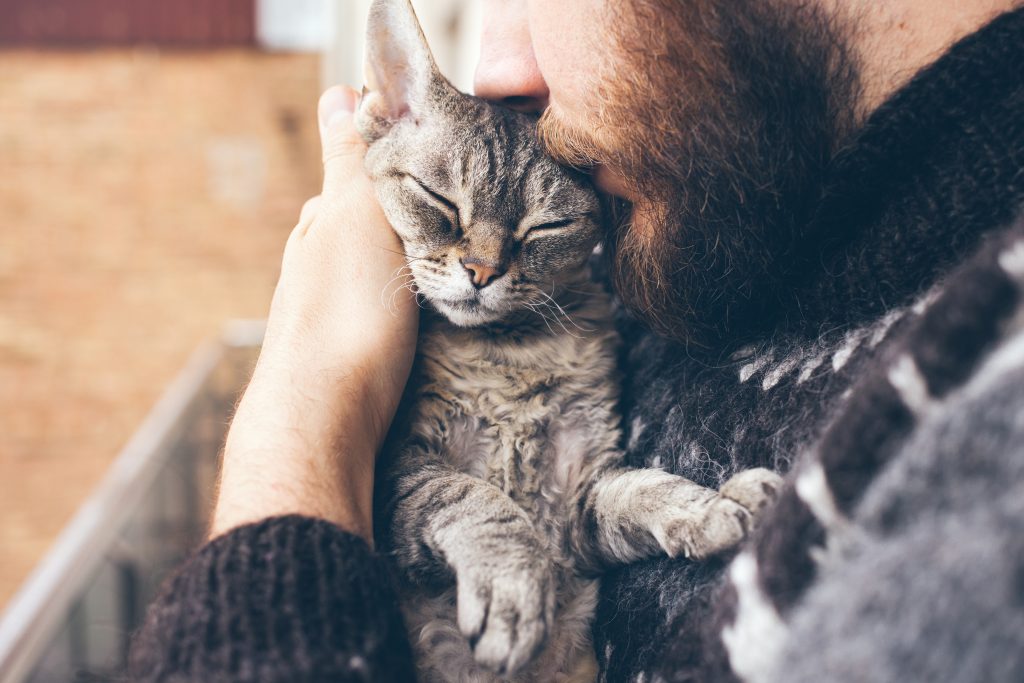When to Euthanize a Cat with Feline Dementia

When to Euthanize a Cat with Feline Dementia is a question that comes up all too frequently. Feline dementia is also known as cognitive dysfunction system. And it happens as your cat ages and is directly related to the brain. Your cats’ abilities begin to change as they reach 11-12 years of age. And dementia typically follows after 15 years.
Just like in humans dementia changes both mental and physical health – affecting memory, learning, and responsiveness. Find out more about feline dementia – when to euthanise here…
Cat Dementia Facts
Cat dementia is related to human dementia. The disease is caused by a decreased blood flow to the brain. And an increase in free radical molecules that damage living cells. The production of these molecules is increased with age. And this results in damage to the sensitive brain cells.
Deposits of protein around the nerve cells make it harder for signals to get to and from the brain. So, maintaining normal brain function becomes extremely difficult. The longer this goes on the harder your cat will find it to do simple things that used to be so natural.
Common Signs of Cat Dementia
If you know the signs of dementia in cats, you’ll be aware of when your cat is starting to struggle. Some of these symptoms are also related to other diseases in older cats such as hyperthyroidism and diabetes. Your vet will do diagnostic tests to ensure the correct treatment.
Cat dementia symptoms may include:
- Changes in sleeping
- Confusion and disorientation
- Restlessness and anxiety
- Excessive licking or complete lack of self-grooming
- Soiling and urinating away from the litter tray
- No social interaction
- Irritability and aggression
- Cat dementia howling – particularly at night
Diagnosing Cat Dementia
The diagnosis for cat dementia involves ruling out other disorders. The disease that gives a lot of the same symptoms is arthritis. And here both the underlying causes and the treatments may be similar.
Other conditions that carry the same signs and symptoms as cat dementia may include:
- Kidney disease
- Hyperthyroidism
- Brain tumours
- Deafness
- Blindness
Cat with Feline Dementia – Expected Life Expectancy

It can take years for early signs of dementia to take hold. And to affect your cat’s quality of life. Research has shown that over 50% of cats over the age of 15 are suffering from dementia. And cats are living increasingly longer lives due to a better diet and living conditions.
Once cats develop dementia, they can be become confused and frightened by changes in the environment or too much stimulation. And your vet will need to carefully exclude other diagnoses such as restricted mobility which also causes distress.
Treating Cat Dementia
If your vet diagnoses cognitive dysfunction there are several things you can do to improve the quality of your cat’s life. Although there isn’t an actual cure. You can support your cat by:
- Feeding on a regular schedule without changes to the daily routine
- Asking your vet for diets specifically for brain illnesses rich in vitamins to help improve cognitive functions
- Increasing the number of food and water bowls around the house
- Increasing the number of litter trays and ensuring they have easy access and sandy litter
- Introducing an anti-anxiety plug in or spray to help anxious cats
- Avoiding moving furniture or making changes to minimise confusion
- Providing comfortable hiding and resting places throughout with ramps to aid access if necessary
- Giving your cat just enough attention to provide reassurance but also letting them have time to themselves
- Keeping your temper even when the howling wakes you up in the middle of the night
When to Euthanize a Cat With Feline Dementia
When you cat’s bad days outnumber the good you may need to consider putting him to sleep. Eliminating prolonged or untreatable suffering is the purpose of the procedure. And the suffering is not always physical – with dementia the constant confusion and restlessness is all a mental condition.
Cats are very good at hiding distress, but in extreme circumstances, organs can fail causing chronic nausea and lack of appetite. You’ll need to take into account both the physical and mental ailments of your cat and discuss these with your vet to make a decision that you can live with.
It’s normal to struggle with feelings of guilt associated with the decision to euthanise your cat. Particularly when you have a unique bond that you’ve shared for so many years. And you simply can’t imagine life without them. Your vet will be a valuable source of support. As will grief counsellors who specialise in the loss of cats. And understand exactly what you’re going through.
Home Visit Services
When to Euthanize a cat with Feline Dementia is often inevitable. Sometimes cat euthanasia at home may sadly be your final option – provided by professional and experienced vets with understanding and compassion. Your cat will be calm and relaxed in familiar surroundings with the family he loves. A sedative will put your cat into a deep sleep. Then the second injection containing anaesthetic will help them to pass away. And your cat will finally be at peace.
Tags: cat dementia, pet euthanasia, should i put my cat downCloud 9
To ensure accuracy, a professional vet has reviewed and verified the information presented in this article. It is important to note that when it comes to making decisions about euthanasia for your pet, there are no easy answers. It is always recommended to seek advice from your own veterinarian before making any decision.



